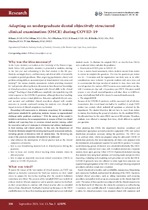Adapting an undergraduate dental objectively structured clinical examination (OSCE) during COVID‑19
Abstract
In the 5-year dentistry curriculum at the University of the Western Cape,
South Africa (SA), prosthetic dentistry is presented as modules, starting
in the 2nd year and culminating in the final module in the 5th year.
Students are taught theory, and laboratory and clinical skills of removable
(complete or partial) prostheses. Thus, acquiring psychomotor, clinical and
problem-solving skills are an essential part of dental students’ education and
training.[1] For trainee dentists, assessments include providing treatment
for ‘real patients’, allowing them to demonstrate how theoretical knowledge
of clinical procedures may be integrated with clinical skills in the clinical
setting.[1] Teaching of clinical skills was completely interrupted during SA’s
initial response to the COVID-19 pandemic, although theoretical teaching
continued on various virtual platforms. Educators uploaded clinical cases,
and narrated and scaffolded clinical procedures aligned with module
outcomes to provide continued training for students, even though the
impact in terms of clinical competence was limited.

